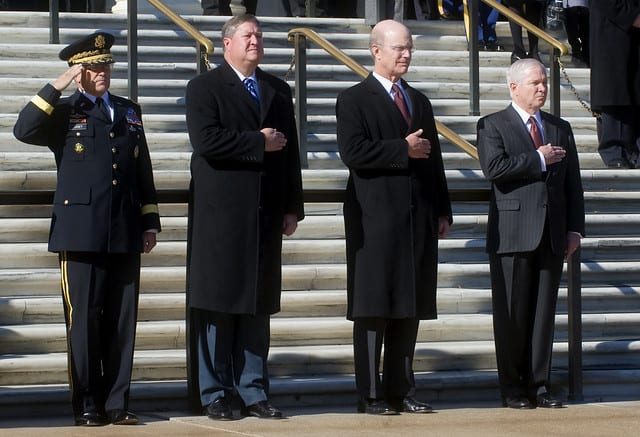What is the proper response of the Christian believer to persecution?
Should the believer sheepishly submit to persecution and abuse? After all, Jesus told us to expect persecution for righteousness’ sake and for the gospel’s sake (Matthew 10:16–32). He even pronounced a blessing upon those who are mistreated in this way (Matthew 5:10–12).
Yet Jesus clearly explained his reasons for telling us to expect persecution and resistance. He didn’t want us to be surprised or shocked by it, as though something strange was happening to us. Jesus didn’t want our faith to be shaken by persecution. So He explained that if the world persecuted Him, it would persecute us as well (John 15:18–25).

Yet Jesus certainly didn’t encourage us to seek persecution. In fact, He instructed His disciples, “When they persecute you in one city, flee to the next” (Matthew 10:23). Jesus Himself made a point to avoid Judea toward the end of His earthly ministry because He knew the religious leaders were seeking to kill Him (John 7:1).
Jesus submitted Himself to God when it came to His own arrest, torture, and execution that was unavoidable. He forgave His tormentors and murderers, prayed for them, and remained a true witness of the truth (Luke 23:34). Peter told us that by doing so, Jesus left us an example that we should follow in His steps (1 Peter 2:21). Since persecution and the Christian life seem so inseparable, it makes one wonder if it is ever appropriate for Christian believers to seek protection from the government against persecution and abuse. Or, are we too merely accept it as God’s will for our lives and as an opportunity to be a witness for Christ?
Paul’s Example
Paul the apostle’s example is worth noting. Paul had more than his share of persecution. Take time to read the account of his afflictions in 2 Corinthians 11:22–33. No doubt this was part of the reason why Paul told Timothy that “All who live godly in Christ Jesus will suffer persecution” (2 Timothy 3:10–12).
Yet, Paul did not see persecution as a desirable state of affairs. In fact, he commanded Timothy to have God’s people pray for kings and all in authority. The goal of these prayers was that “we may lead a tranquil and quiet life in all godliness and dignity” (1 Timothy 2:1–2). Earlier in Paul’s life, the Jerusalem church sent Paul from their midst because he had become such a magnet for persecution. The result was that the church in Jerusalem and Judea enjoyed peace and grew (Acts 9:28–31).
Paul’s Citizenship

One aspect of Paul’s example that is illustrative was his use of his Roman citizenship as a means to minimize persecution. While in the city of Philippi, Paul and Silas had been beaten and jailed unlawfully. When the city magistrates ordered their release, Paul demanded that they come in person. He did this to inform them that they had unjustly punished a Roman citizen (Acts 16:35–39). In this case, Paul didn’t exercise his Roman rights for his own sake, since he waited until after the event. He probably did so for the sake of the jailer who, against all protocol, had brought Paul and Silas to his own home to tend to their wounds.
Later, in Acts 22:25–29, Paul exercised his Roman rights to avoid a very painful “examination by scourging.” A Roman commander had just rescued Paul from an angry mob. The standard procedure required that the soldiers whip him mercilessly in order to soften him up for questioning. Paul preempted this action by informing the commander of his Roman citizenship.
Paul further benefitted from his Roman status after a band of Jewish zealots had formed a plot to assassinate him. He received an armed escort, numbering several hundred soldiers, to deliver him safely from Jerusalem to the governor in Caesarea (Acts 23:12–35). Later, when the Roman governor pressured Paul to travel back to Jerusalem, he again utilized his Roman rights for his own protection. The apostle appealed to Caesar, demanding that he be safeguarded for the Emperor’s decision on his case (Acts 25:7–12). This appeal not only protected Paul against another assassination attempt. It also brought him to Rome at the Emperor’s expense—a trip he had long desired to make on his own (Acts 19:21; 23:11; Romans 1:15).
Government and the Christian
In his letter to the Roman church, Paul explained the Christian’s relationship with the government. He stated that believers have an obligation to obey the government and support it with their taxes (Romans 13:1–7). Yet it is also clear that he believed the government had the obligation to protect its subjects from abuse and persecution.

I believe Paul’s own use of his Roman status authorizes every believer to exercise whatever rights their government promises them. This is especially true in a representative republic, such as the United States, in which citizens can participate in government. The First Amendment of the U.S. Constitution guarantees all American citizens the right to the free exercise of their faith—as well as the freedom of speech. Under the Constitution, it protects prayer, worship, and proclaiming the gospel. Whenever an individual or an organization tries to curtail these freedoms, it is the believer’s right and obligation to redress such offenses.
Furthermore, believers in America should vote in accordance with their beliefs and express their sentiments to their elected representatives. Wicked and godless people will continue to use our government to legislate and enforce unjust laws to make America a hostile environment for Christian believers. They, therefore, have the obligation to counter these efforts and ensure civil liberties for all people.
PRAYER:
Dear Father in heaven, please bless the United States of America. Breathe a revival across our land and create in us a hunger and thirst for righteousness—as well as an abhorrence for evil. Raise up men and women of God to be our representatives and leaders in government. Do not allow, we pray, the wicked and godless to reign over us, to make our laws, or to set the course for this nation. But raise up men and women of God to be our Presidents, our senators, our congressmen, and our Supreme Court justices. We join our voices with the rest of Your saints and pray, may Your kingdom come and may Your will be done on earth—and in America—as it is in heaven. Amen.
In article photos in order of appearance: Locate and Close With by the U.S. Marine Corps licensed under CC BY-NC 2.0
Red, White, and Blue by U.S. Army licensed under CC BY 2.0
www.Army.mil by the U.S. Army licensed under CC BY 2.0







